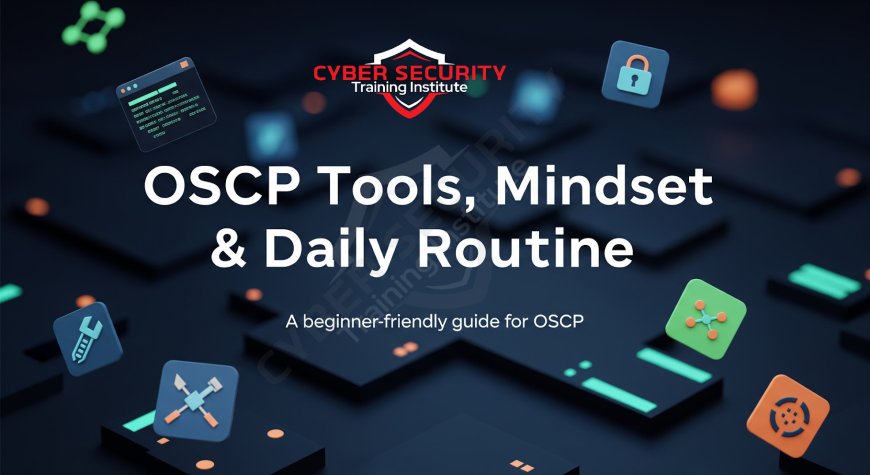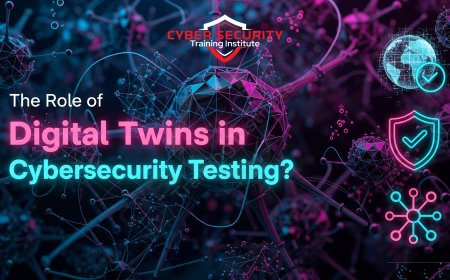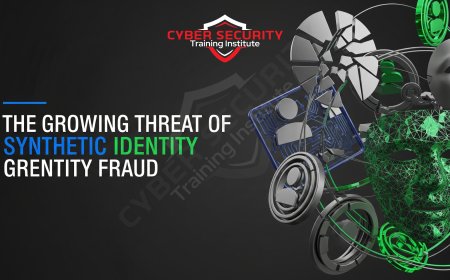Getting Started with OSCP Tools, Mindset & Daily Routine | A beginner-friendly guide to prepare efficiently for OSCP
Beginner’s guide to OSCP exam preparation covering essential tools, mindset tips, and a daily study routine for success in ethical hacking certification. This beginner-friendly OSCP preparation guide explores everything you need to succeed in one of the most respected ethical hacking certifications. Learn about key tools like Nmap, Metasploit, and enumeration scripts, cultivate the right hacker mindset, and follow a structured daily routine to build your skills consistently. Ideal for students, IT professionals, and self-learners aiming to break into cybersecurity with the OSCP.

Table of Content
- Introduction
- Understanding OSCP
- Must-Have Tools for OSCP Prep
- Developing the Right Mindset
- Sample Daily Routine
- Pro Tips for First-Time Takers
- Conclusion
- FAQ
Introduction
The Offensive Security Certified Professional (OSCP) is one of the most recognized ethical hacking certifications in the cybersecurity world. It’s not just a test of your knowledge — it’s a test of your patience, persistence, and problem-solving ability.
Whether you're a student, IT professional, or self-taught enthusiast, this blog will guide you through the essential tools, mindset, and daily routine needed to efficiently prepare for the OSCP.
Understanding OSCP
Before jumping in, it’s important to know what OSCP is:
-
Exam Duration: 24 hours
-
Format: Practical penetration test — hack into machines, document everything.
-
Goal: Earn enough points by compromising systems and submitting a detailed report.
-
Pre-requisite: Basic understanding of Linux, networking, and scripting (especially Bash/Python).
Must-Have Tools for OSCP Prep
Here are the essential tools every OSCP candidate should get familiar with:
✅ Operating System
-
Kali Linux: The official OS used in the OSCP exam. Pre-installed with most tools.
✅ Scanning & Enumeration
-
Nmap – Network scanning and port discovery
-
Netcat – Port listening and shell interactions
-
Enum4linux – SMB enumeration
-
Nikto – Web server scanning
-
Gobuster / Dirb – Directory brute-forcing
✅ Exploitation & Privilege Escalation
-
Metasploit – Framework for exploitation (limited use allowed in exam)
-
Searchsploit – Local exploit database
-
Linux Exploit Suggester / WinPEAS / LinPEAS – Privilege escalation scripts
✅ Scripting
-
Python & Bash – For writing custom exploits and automation
-
Impacket tools – Especially
psexec.py,smbclient.py, etc.
✅ Documentation
-
CherryTree or Obsidian – For note-taking
-
KeepNote (still used by some)
-
Screenshot tools – Flameshot or built-in tools
Developing the Right Mindset
The OSCP exam isn’t just about hacking; it’s about thinking like a hacker. Here's the mindset to adopt:
Try Harder Philosophy
The OSCP motto. It means never give up easily — troubleshoot, research, and try new approaches.
Curiosity over Memorization
Instead of memorizing commands, focus on understanding how things work — why does a service respond a certain way? What does that tell you?
Persistence & Patience
Some machines will take hours. That’s okay. Every failure is a lesson that builds your skills.
Sample Daily Routine
Consistency is key. Here’s a recommended daily schedule for OSCP preparation (especially for those balancing work/studies):
Weekday Routine (2–3 hrs/day)
| Time | Activity |
|---|---|
| 6:00–6:30am | Quick read — blog, walkthrough |
| 8:00–9:00pm | Lab practice (one machine focus) |
| 9:00–9:30pm | Review notes & escalate privileges |
Weekend Routine (4–6 hrs/day)
-
Full box walkthroughs (Hack The Box / TryHackMe / OSCP labs)
-
Practice report writing
-
Review weaknesses (Linux privesc, buffer overflows, etc.)
Pro Tips for First-Time Takers
✅ Take notes for everything — every port, command, output
✅ Learn basic buffer overflow — at least 32-bit Windows
✅ Join Discord/Reddit OSCP communities for motivation & help
✅ Practice report writing — OSCP requires a professional report
✅ Stay calm during the exam — time management is more important than technical genius
Conclusion
The OSCP journey is intense but absolutely worth it. With the right tools, a resilient mindset, and a disciplined routine, even a complete beginner can crack it. Don’t rush. Instead, focus on learning deeply, documenting everything, and building real-world hacking skills.
Remember, OSCP isn’t about being perfect — it’s about being relentless.
FAQ
What is the OSCP certification?
The Offensive Security Certified Professional (OSCP) is a hands-on penetration testing certification that tests your ability to identify and exploit vulnerabilities in real-world systems.
How long should I prepare for the OSCP exam?
On average, 2–4 months of consistent preparation (2–3 hours a day) is recommended. However, the duration can vary depending on your prior knowledge and experience.
Do I need programming knowledge for OSCP?
Yes, basic scripting knowledge in Python, Bash, and PowerShell helps in writing custom exploits, automating tasks, and privilege escalation.
Can beginners attempt OSCP?
Yes. While challenging, beginners can succeed by building a strong foundation in networking, Linux, and enumeration, and by following a disciplined study plan.
What tools should I learn for OSCP?
Must-know tools include Nmap, Netcat, Metasploit (limited use), Gobuster, Enum4linux, PEAS scripts, and Searchsploit among others.
Is Metasploit allowed in the OSCP exam?
Yes, but its use is restricted. You are allowed to use Metasploit on only one machine during the exam, so manual exploitation is crucial.
How important is report writing for OSCP?
Very important. Even if you complete the technical part, failing to submit a well-structured report can disqualify you from passing the exam.
What is the “Try Harder” mindset?
It’s the OSCP philosophy that encourages persistence, problem-solving, and continuous learning — pushing through challenges instead of giving up.
Are platforms like Hack The Box and TryHackMe useful for OSCP prep?
Absolutely. They help simulate real-world machines, sharpen your skills, and offer a practical lab environment similar to the OSCP exam.
What happens if I fail the OSCP exam?
You can retake the exam by purchasing a retake voucher. Many people don’t pass on their first attempt — persistence is key.
What's Your Reaction?
 Like
0
Like
0
 Dislike
0
Dislike
0
 Love
0
Love
0
 Funny
0
Funny
0
 Angry
1
Angry
1
 Sad
0
Sad
0
 Wow
0
Wow
0
















